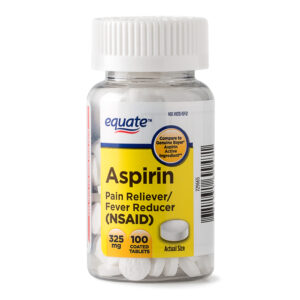
Key points
- Although aspirin is often prescribed to dogs for pain management, it comes with many risks;
- Your dog may experience a number of side effects such as loss of appetite, vomiting, diarrhea (possibly bloody) or black, tarry stools, bleeding disorders, and stomach ulcers after taking aspirin;
- Aspirin for dogs and human aspirin differ significantly, and dogs generally can’t digest pills meant for humans;
- The safe amount of aspirin depends on the dog’s size – the larger the animal, the larger dose it needs;
- Natural alternatives to aspirin include turmeric, Boswellia, devil’s claw, and VitaminA supplements.
Some pet owners think that what is good for them must also be suitable for the pet they love. For example, acetylsalicylic acid (Aspirin®) is one of the most common human pain relievers. Although veterinarians often prescribe human drugs to animals, there are no aspirin formulations that have been approved specifically for use in dogs and cats. However, when a veterinarian prescribes medication to pets extra-label, they use all of their knowledge and experience to evaluate the situation and determine whether the drug will be safe and beneficial to the pet in the specific circumstances. Since you, as a pet owner, likely don’t have the necessary education to make an informed decision regarding your pet’s treatment, you should never give aspirin to your dog unless it has been prescribed by a licensed vet.
Table of Contents
What is Aspirin?

Aspirin, or acetylsalicylic acid, is a medication that belongs to the group of non-steroidal anti-inflammatory drugs also known as NSAIDs. Other examples of NSAIDs include ibuprofen, naproxen, carprofen, etc.
Aspirin is a widely used medication that can be obtained at any pharmacy without a prescription. It is used in both humans and animals even though it has only been approved for use in humans. For animals, it is an off-label medication prescribed to control pain associated with musculoskeletal injuries, inflammation, and fever. It can also prevent clots from forming in the blood.
Why Give Aspirin to a Dog?
Typically, aspirin is prescribed to dogs suffering from osteoarthritis or musculoskeletal inflammation. Due to its anti-inflammatory properties, aspirin can help reduce pain and inflammation caused by these conditions and alleviate associated symptoms. Aspirin is also used to treat a range of other conditions. However, you should remember that the side effects of aspirin for dogs can be severe if the medication is not administered correctly, and thus always follow your veterinarian’s instructions.

Side Effects of Aspirin in Dogs
Although aspirin has fewer side effects than, for example, steroid medications, several other NSAIDs like Rimadyl are safer for long-term use in dogs. Adverse reactions to aspirin occur in canines quite often, which means it is crucial to be aware of potential side effects before administering aspirin to your dog. If you notice your dog displaying symptoms such as vomiting, diarrhea, mucosal erosion, ulceration, or black, tarry stool, you should stop giving your pet the medication and call a veterinarian.
You should also be sure to monitor your dog’s behavior if you recently started giving it new medication. Any changes in your pet’s demeanor or activity levels might be a signal of an adverse reaction to the drug.
Symptoms of Aspirin Poisoning in Dogs
When a dog ingests an abnormally large dose of aspirin, it can exhibit the following symptoms:
- stomach pain
- stomach ulcers
- sialorrhea (excessive salivation)
- vomiting
- throwing up blood
- diarrhea
- fever
- tremor
- seizures
- shortness of breath
- general weakness/apathy
- tarry stools
- loss of appetite/thirst
- renal failure
- brain edema
- death
If your pet has taken too much aspirin, it is imperative to contact an emergency veterinarian regardless of whether the animal shows signs of intoxication or not. This way, the veterinarian can assess the risk of poisoning based on the dose ingested and the animal’s size right away. They can also tell you how to make your dog vomit if the pet ingested aspirin less than an hour ago.
If you decide to take your pet to the vet, take the box of medication the pet swallowed with you to the visit. Unfortunately, there is no specific antidote for aspirin. However, the veterinarian may provide treatment to expedite the elimination of the drug from the body by inducing vomiting, conducting gastric lavage (if recently ingested), or administering charcoal.
In the most severe cases, the animal will need to be admitted to the clinic to receive adequate care, including:
- administration of gastrointestinal protectors or medication to manage symptoms;
- fluid therapy (IV fluid resuscitation) and blood tests to evaluate the dog’s health condition and monitor changes.
Aspirin Dosage for Dogs
The FDA has not approved aspirin for use in canines, and, therefore, there is not enough information to accurately determine the appropriate dosage of aspirin for a dog. However, according to the Merck Veterinary Manual, the optimal dose lies between 10 and 40 mg of aspirin per kilogram of body weight. The dosage might also depend on your dog’s health condition. Remember that an overdose of aspirin can be fatal for your furry friend. Also, be sure to ask your veterinarian what kind of aspirin you have to buy since there are many different brands and formulations. For example, enteric-coated aspirin tablets, well-suited for human stomachs, are typically not digestible for dogs.
You should also remember to tell the vet which medications your dog is currently taking to avoid potential drug interactions.
Alternatives to Aspirin
If your dog is showing signs of pain, you should consult a veterinarian so they can determine the origin of the disease and address it. While some vets may prescribe aspirin to treat the condition, there are many other effective pain relief alternatives for dogs.
For example, carprofen is typically better tolerated by dogs and is widely used to treat osteoarthritis and other inflammatory conditions. Meloxicam, deracoxib, firocoxib, and etodolac are other popular veterinary meds.
You should also remember that ibuprofen and paracetamol are very toxic to dogs and should never be given to them.
If you want to alleviate your pet’s pain while you wait for the vet appointment, you can try different natural pain relief solutions, such as applying an ice pack or administering herbal remedies. The most popular and effective natural alternatives to aspirin are turmeric, Boswellia, and devil’s claw. VitaminA oil and supplements are also very effective for many canine conditions.
Other pain management methods in canines include diet changes, physical exercise, food supplements with Omega–3 fatty acids, cold-laser therapy, and physical therapy.
All things considered, you need to remember that these types of alternative solutions should not replace or delay a consultation with a licensed veterinarian.
FAQ
Can you give dogs aspirin for pain?
Vets sometimes prescribe aspirin to dogs to treat pain associated with osteoarthritis or musculoskeletal inflammation in canines. However, you should not give your pet this medication without consulting a professional first.
Can you give a dog Benadryl for pain?
When used according to the vet’s instructions, Benadryl is considered to be a safe and effective drug for dogs. However, you should only give this drug to your dog if a vet prescribes it and closely monitor your pet for any signs of an adverse reaction.
How much aspirin can I give my 60 lb dog?
Typically, your dog will need at least 5 mg of aspirin per pound of body weight. Thus, if it weighs 60 lb, the correct dosage will be 300 mg, which should be given every 12 hours.
Is baby aspirin safe for dogs?
Human aspirin is very dangerous for dogs unless a vet prescribes it. Thus, you should avoid giving your pet medications without prior consultation with a professional.
What anti-inflammatory drugs are suitable for dogs?
Non-steroidal anti-inflammatory medications (NSAIDs) that are designed specifically for use in dogs include carprofen (Novox or Rimadyl), meloxicam (Metacam), deracoxib (Deramaxx), deracoxib (Deramaxx), and firocoxib (Previcox).
What happens if a dog takes aspirin?
Many vets prescribe aspirin to dogs to treat certain conditions. So if your dog takes a small amount of aspirin, it’s not necessarily dangerous. However, you should call a vet to consult regarding the situation anyway, since the pet may experience interactions with other drugs it’s on. If your pet has swallowed too much aspirin at once, you need to seek immediate veterinary help.







